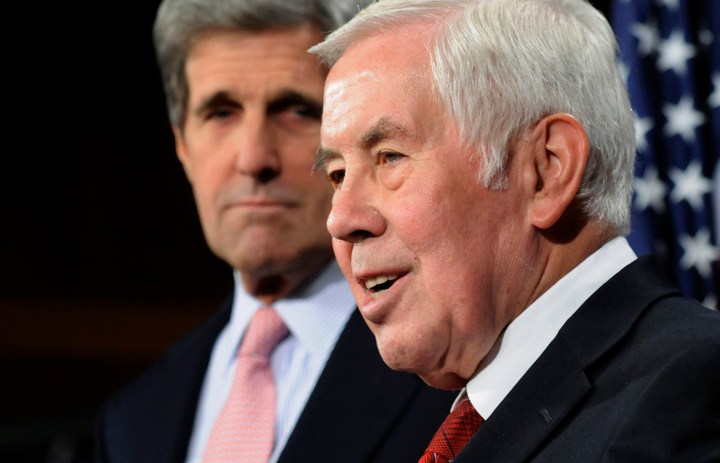While most attention on the American electoral process has focused on the primary process within the Republican Party, South Africans should also take note of the outcome in the Republican primary election for the candidate for senator of Indiana. J BROOKS SPECTOR reflects upon long-time senator Richard Lugar’s defeat.
Indiana’s Richard Lugar, one of the longest-serving senators in the US, is the 80-year-old man whose political shadow was so long that the last time he ran for office he was unopposed by a Democratic opponent. Also, he had not had a Republican primary opponent since 1976. And yet, he has just been beaten for his party’s nomination by Tea Party-backed state treasurer Richard Mourdock, who will now face moderate-centrist Democratic congressman Joe Donnelly in the general election in November.
For decades, Lugar had carefully crafted a reputation as Indiana’s most magisterial politician, an expert on foreign policy issues in the old-style internationalist, establishment Republican tradition, a man who seemed most satisfied in his work when he was able to forge bipartisan consensus on important international issues.
On domestic issues, Lugar had worked to guard his political flanks by a distinctly conservative bias but, in the end, a simple but emphatic campaign slogan – “Retire Lugar” – encapsulated local grievances and irritations directed against him, as well as the more worrying charge that he was insufficiently partisan. That, in turn, brought together enough Republican voters to turf him out of office – even before he had to face a Democratic opponent.
For South Africans, Lugar’s most important contribution from his life in American politics was his contribution in shepherding the Comprehensive Anti-Apartheid Act of 1986 through the US Senate twice – the second time after it had been vetoed by then-president Ronald Reagan.
For this writer at least, Lugar deserves serious recognition for his role in undermining the legitimacy and resilience of South Africa’s apartheid regime. Together with the persistent public pressure generated by Randall Robinson’s TransAfrica and the Free South Africa Movement, and the collapse of the regime’s international creditworthiness after the Chase Manhattan Bank refused to roll over South African debt, Lugar’s effort in engineering a U-turn away from the disastrous policy of constructive engagement was critical in aligning America with the forward march of history in South Africa.
Back to the US politics of now, commentators have been quick to point out a growing mood of anti-incumbency among voters – especially Republican – but among some Democrats as well. This, coupled with a growing shift rightward among Republican office holders and a declining sense of any willingness to build bipartisan consensus on important national issues, increasingly left Lugar looking like a throwback to another, earlier, more genteel, less partisan age.
In fact, this sentiment may also have important implications for the future of all incumbent candidates. The AP noted: “In one state at least, anti-incumbent sentiment is coursing through the electorate, a potentially ominous sign for the incumbent Democratic president seeking a second term and lawmakers of all political stripes. The GOP also remains deeply split between the establishment wing and insurgent Tea Party, a fissure that underscores the challenge the presumptive Republican presidential nominee and other GOP candidates face in the months ahead to unite the party.”
Lugar, despite having conservative credentials for domestic policy, was severely lashed by his opponent over his co-operation with Democrats on issues like non-proliferation. This has helped highlight the extent to which bipartisan dealmakers have emerged as an endangered species in the American Congress, helping make this body one that is increasingly stymied by partisan gridlock. Lugar’s upcoming departure follows the retirement of yet another exponent of bipartisanship, Republican Senator from Maine Olympia Snowe.
Despite Lugar’s reputation for civility, he wasted no time in harshly criticizing the man who will now be his party’s nominee. After he conceded defeat, Lugar lambasted Mourdock for embracing “groups whose prime mission is to cleanse the Republican Party of those who stray from orthodoxy as they see it. This is not conducive to problem solving and governance… And he will find that unless he modifies his approach, he will achieve little as a legislator. Worse, he will help delay solutions that are totally beyond the capacity of partisan majorities to achieve.”
These words, clearly spoken in anger, will do little to help heal the rift between the remnants of the Republican Party old-line establishment and its feisty Tea Party opponents.
While Lugar’s defeat removes a champion of senatorial bipartisanship, looking ahead to November, Lugar’s defeat may just possibly open a door for Democrats who are anxious to cling to their four-seat majority in the 100-member senate. Now that their candidate will be facing an arch-conservative candidate, national Democrats are reassessing how they can support Joe Donnelly in his fight against Mourdock.
But whether they go all out for Donnelly with some serious cash – money that may well be needed elsewhere in really close races – remains an open question, especially given their difficulties in winning statewide races in Indiana in recent years. If Barack Obama became the first Democrat to win Indiana in a presidential election since 1964, he only did so by one percentage point.
Nonetheless, Democratic Senatorial Campaign Committee spokesman Matt Canter has already said this Indiana race “could move in a more competitive direction” and an independent action committee that supports Democratic candidates began attacking Mourdock before the polls had even closed. His attackers are describing him as out of step, not just with mainstream Republicans, but also with mainstream voters as a whole.
In shaping his winning strategy, Mourdock relentlessly questioned Lugar over his longtime Washington ties, real life in the Virginia suburb of MacLean, and his use of address of convenience at an Indiana farm he rarely visited. Moreover, he pounded Lugar over his co-operation with Obama, especially his support for Obama initiatives on nuclear nonproliferation and his votes to confirm Obama’s two appointees to the Supreme Court. But it was Mourdock’s constant pointing to Lugar as being a quintessential “Washington man” rather than a man of his home state that seems to have clinched the deal with Republican primary voters.
And this, in turn, will be food for late-night contemplation to the 13 incumbent Republican senators who will face the choice of whether they should run for office again in two years’ time. Or as South Dakota Republican Senator John Thune, chair of the Republican Conference, has already observed: “There are lots of folks who are watching every member’s voting records. You’re not only going to be attacked by your opponent on the Democrat side, but there are obviously Republicans out there who may not like it when you’ve been around a few years and you got a lot of votes.”
The Politico website underscored this concern, noting “…there is no denying that any [Republican] member who breaks even episodically with conservative orthodoxy could face a serious primary, like Utah Sen. Orrin Hatch; flee the Senate before a potential intra-party fight, such as Maine Sen. Olympia Snowe; or see their careers ended in an embarrassing loss before they even get to the general election, like Lugar, Bennett and Castle. And that means GOP incumbents are already preparing for 2014 challenges from the right to avoid pulling a Lugar of their own.”
Lugar’s defeat and his absence from the Senate will likely have real consequences for either an Obama – or a Mitt Romney – foreign policy agenda, to the extent that such an agenda is reliant upon broader, bipartisan support.
South Africans should be attuned to this debate to the extent that it will affect support for future foreign aid programmes, multilateral initiatives on a wide array of issues and support for international institutions. DM
Read more:
- Lugar loss has lessons for Republicans, Democrats at the AP.
- Call it the Mike Castle rule. Or the Bob Bennett rule. Or, now, the Sen. Dick Lugar (R-Ind.) rule of politics at the Politico website.
- Lugar Loses Primary Challenge in Indiana at The New York Times.
- Moderate Republicans Fall Away in the Senate at The New York Times.
- Many Pursuits, but Bipartisanship Isn’t One of Them at The New York Times.
- Richard Lugar loses primary nomination to conservative challenger Richard Mourdock at the Washington Post.
- THE COMPREHENSIVE ANTI-APARTHEID ACT: A CASE STUDY IN THE LEGALITY OF ECONOMIC SANCTIONS at the Washington Lee University Law Review.
- A SUMMARY OF THE COMPREHENSIVE ANTI-APARTHEID ACT.
Photo: Senator Richard Lugar (R-IN) addresses a news conference to discuss their support of ratifying the new START treaty, at the U.S. Capitol in Washington, December 21, 2010. REUTERS/Jonathan Ernst.







 Become an Insider
Become an Insider